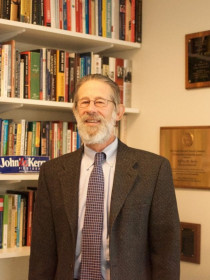
Jeffrey M. Berry
John Richard Skuse Professor of Political Science, Tufts University
Chapter Member: Boston SSN
Areas of Expertise:
Connect with Jeffrey
About Jeffrey
Berry’s research focuses on interest groups, especially citizen groups and their voice in the governmental process. He also conducts research on city politics, sustainability, and, most recently, political opinion media such as cable TV, talk radio, and the political blogosphere.
Contributions
The Roots and Impact of Outrage-Mongering in U.S. Political Opinion Media
Key Findings Brief,
In the News
Quoted by Christian M. Wade in "Photo-ops with Democrats Gives GOP Governor an Edge," Gloucester Times, July 12, 2018.
Opinion: "Why are Democratic Voters More Approving of Compromise than Republicans?," Jeffrey M. Berry, The Conversation, June 29, 2018.
Quoted by Dwayne Harmon in "Elizabeth Warren Not Running for President, Unless She Does," Newburgh Gazette, March 11, 2018.
Quoted by in "Elizabeth Warren Seeks to Put 'Pocahontas' Barbs Behind Her," Cherokee Phoenix, March 10, 2018.
Quoted by Steve LeBlanc in "Elizabeth Warren Seeks to Neutralize 'Pocahontas' Barbs," Seattle Times, March 5, 2018.
Quoted by Chris Lisinski in "L'Italien, Matias See Financial Support from Interest Groups," The Sentinel & Enterprise, February 26, 2018.
Quoted by Louis Jacobson in "How Might a 2018 Democratic Wave Affect Governor's Races?," Governing, February 14, 2018.
Quoted by Katherine Q. Seelye in "Joseph P. Kennedy III to Respond to State of the Union for Democrats," New York Times, January 30, 2018.
Quoted by Chris Lisinkski in "3rd District Candidates Raking in Cash," Lowell Sun, January 29, 2018.
Quoted by Scott Malone in "Bernie Sanders Brings Local Politics Focus to Massachusetts Races," Reuters, October 23, 2017.
Quoted by Maria Gallucci in "Can Republicans Dump Trump as Their 2016 Presidential Candidate?," Mashable, October 9, 2016.
Quoted by Jess Bidgood in "Massachusetts Poised to Expand Protections for Transgender People," New York Times, June 1, 2016.
Quoted by Ben Gittleson in "John Kasich Chills in Northeast as Rivals Sweat in South," CBS, February 20, 2016.
Research discussed by , in "Professors Examine Outrageous Political Speech in Current Election Cycle," Tufts Daily, February 19, 2016.
Quoted by Katharine Q. Seelye in "New England Delegation Acquires a Tinge of Red," New York Times, November 5, 2014.
Quoted by David Scharfenberg in "A Sense of Unknowability in the Governor’s Race," Boston Globe, November 2, 2014.
Quoted by Kris Maher in "Massachusetts Democrat is Locked in Another Tight Race," Wall Street Journal, October 27, 2014.
Quoted by Fred Thys in "Why It Could Pay off for Charlie Baker to Focus in on Boston," WBUR National Public Radio, October 21, 2014.
Guest on CNN’s Reliable Sources, January 12, 2014.
Opinion: "Our Outrageous Media Created the Tea Party," Jeffrey M. Berry (with ), Salon, December 7, 2013.
Publications
"Civil Society and Sustainable Cities" (with ). Comparative Political Studies 47, no. 3 (2014): 395-419.
Discusses research from 50 large American cities that argues that the number of local environmental protection policies and programs is strongly related to the inclusion of environmental groups in urban policymaking; analyzes the impact of environmental advocacy.
"The Outrage Industry: Political Opinion Media and the New Incivility" (with ) (Oxford University Press, 2014).
Examines cable TV, talk radio, and the political blogosphere, as business sectors that operate under economic incentives that lead them to promote polarization through provocative and abrasive political commentary.
"Lobbying and Policy Change: Who Wins, Who Loses, and Why" (with ) (University of Chicago Press, 2009).
Addresses the question of who wins and who loses in Washington politics; argues that interest group resources are not related to outcomes in policymaking and that the lobbying community so strongly reflects the status quo, that it will not fundamentally alter the balance of power unless its makeup shifts dramatically in favor of average Americans’ concerns. Winner of the Leon D. Epstein Outstanding Book Award, Political Organizations and Parties Section, American Political Science Association, 2010.
"A Voice for Nonprofits" (with ) (Brookings Institution, 2003).
Argues that nonprofits badly misunderstand the tax law under which they operate and that because nonprofit leaders mistakenly believe that they are not allowed to lobby, the lobbying world is increasingly skewed in favor of business, labor, and professional associations. Winner of the Leon D. Epstein Outstanding Book Award, Political Organizations and Parties Section, American Political Science Association, 2004.
"The New Liberalism: The Rising Power of Citizen Groups" (Brookings Institution, 1999).
Uses the agenda of Congress as a window into interest group politics to document the changing face of liberalism; argues that over time, liberal lobbies moved away from working on economic and labor issues to advocacy around quality of life (or “postmaterialist”) issues such as environmental quality and consumer protection. Winner of the Aaron Wildavsky Best Book Award from the Policy Studies Organization, 1999.